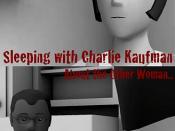Our common perception of cinema, and more importantly, good movies, is that it is a reflection of reality. What movies which we find so amazing, and garner tons of money at the box office do so well is that such films immerse us, the viewers in the experience of watching the movie. Movies like this make us feel as if we are actually part of the story, and that we are there with the characters. The film Adaptation presents the other tradition of cinema, one much less used and even less watched by the typical casual movie-goer. Adaptation is a metafictional film, and this can be seen in several ways.
A piece of literature, by definition, is metafiction if it is self-conscious of its status as an artifact, hence an object of scrutiny. Metafiction blurs the line between reality and fiction. Unlike the conventional film, which makes us feel that we are in reality, in the reality of the movie, metafiction actually knows that it is fiction, that it is merely a story, and it expresses that to the viewers.
This can be seen in Adaptation during the voice-overs of Charlie Kaufman, commenting on his life, and on what he was doing. He was conscious of himself as a character.
Another way in which Adaptation is metafiction is the fact that the main character in the movie, Charlie Kaufman, who we see is adapting the book The Orchid Thief, whatever he writes for his screenplay (in the film) actually comes true in the actual film we are watching. Charlie Kaufman initially wanted to write a story about flowers, with no Hollywood effects, with no storyline about sex, drugs or violence. He wanted a simple, slow film without drama. While his mindset on writing was like this, so was the...


